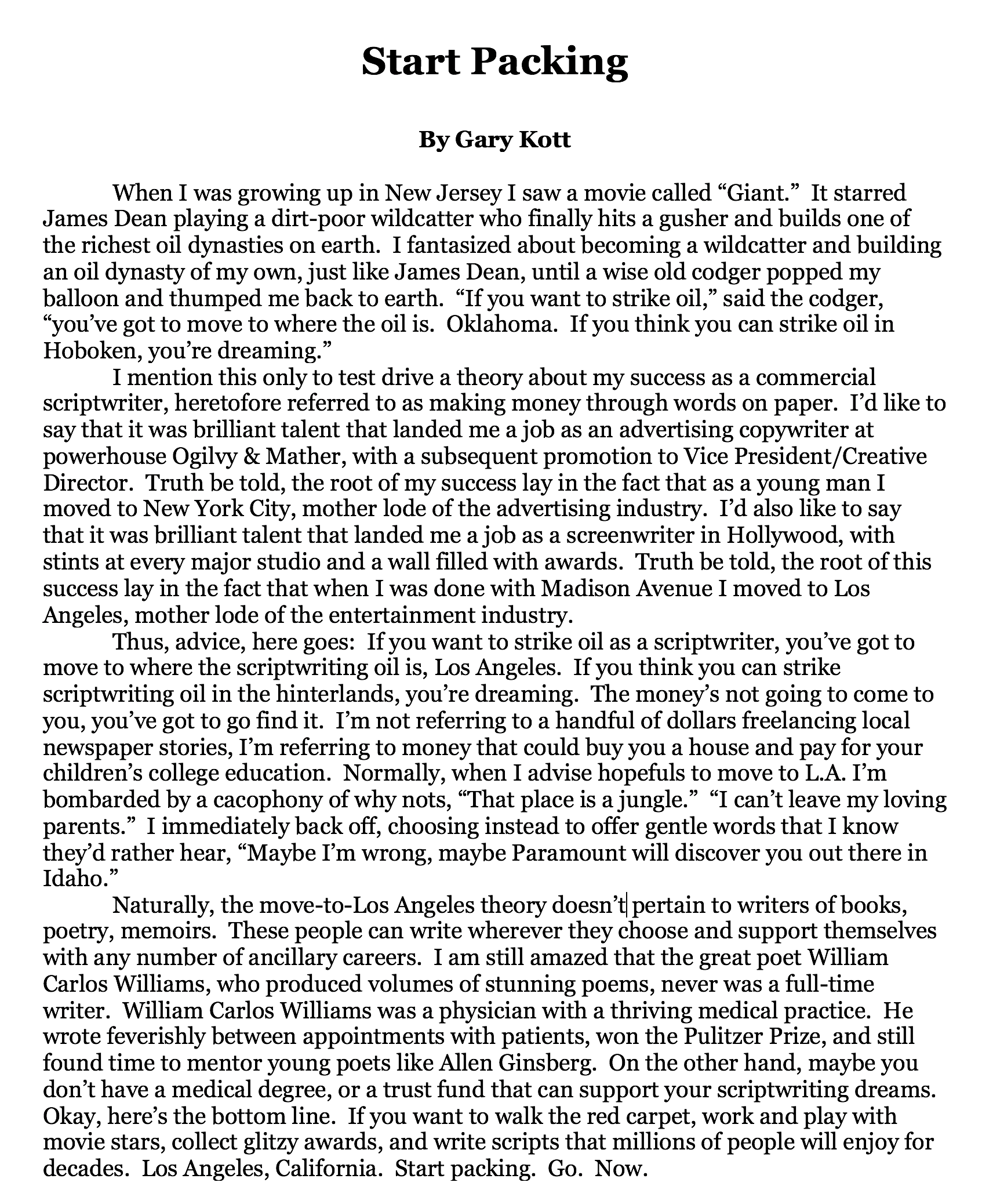
More About Mining For Gold
A friend that created three hit television shows put it to me simply, “Hollywood is not a place to make a living, it’s a place to make a killing.” True news but bad news for anyone thinking they can live a nine-to-five life, bring home steady pay checks, be handed comfortable bonuses, health insurance, profit-sharing. I’m not talking about network or studio executives that land relatively long-term corporate positions, I’m talking about creative types trying to earn a penny off their skills in writing, acting, tap-dancing. For them, other than their talents, the greatest job asset necessary to bear the brutal road to their killing, would be an inner strength to withstand unfathomable hours of relentless grinding away. When I worked on Madison Avenue, I heard variations of that hard-knock truism in different forms, “If you don’t show up Saturday, don’t bother to show up Sunday.” And, “Introduce me to people that coach their son’s Little League team and volunteer for worthy charities, I’ll admire those people completely, I just don’t want them working for me.” The unique difference between choosing Hollywood over normal careers is that creative people have no human resource department to submit their job application to, unlike graduates with law degrees that mail in resumes to law firms and eventually get hired by one. If they’re lucky enough to impress movie or television producers, many PhDs find themselves answering telephones and fetching coffee. At best, employment in Hollywood is specious; you get hired to work on a movie or TV show, shooting ends, you’re out of work and looking once more for another job. To put it accurately, those seeking stability need not apply. However, people seeking fame and fortune? Welcome to the bughouse. A place to make a killing — there’s the point of demarcation. A killing to one person is a private jet but to another it’s merely first-class commercial. I wrote scripts for the creator of a television dynasty, blockbuster after blockbuster, and, as an homage to his own success, he built one of the largest mansions in the history of the United States. A year later I wrote scripts for an actor that earned fifty-million dollars a year yet idolized a mega-wealthy industrialist. The actor uttered to me with a trace of self-deprecation, “You think I’m rich? Last week that man wrote out a check for a billion dollars. One billion dollars. Do you think I can write a check for a billion dollars?” When I was working in Hollywood, here was my definition of a killing: Give me enough money to buy my way out from under my divorce agreement, enough money to pay cash for my children’s college education, enough money to build a nest egg that will allow me to write what I want to write versus what they want me to write and to go home from the studio before two o’clock in the morning. My killing had nothing to do with yachts, ski chalets, Ferraris, my killing was freedom. Here’s a good example of my material needs. After years of writing what they refer to as “gig to gig,” barely making ends meet, I finally hit the jackpot, big salary, big office, big business manager that said to me these magic words, “You no longer need to call me and ask if you can afford to buy something, you can just go buy it.” And one day I did. I was driving down Ventura Boulevard and saw a beautiful blue sports car sitting in front of a dealership. I pulled in, took the car for a test drive, and told the salesman, “I’ll take it.” The salesman was thrilled about his quick victory, until I handed him my business manager’s card and said, “Call him to haggle price.” Reluctantly, the salesman made the phone call, knowing that Hollywood business managers love to muscle car dealers into rock-bottom prices. I sat far away as the phone call was in progress, secretly enjoying watching the salesman squirm. After haggling concluded, the salesman handed me the keys to the sports car and the telephone, “Your busines manager wants to talk to you.” I took the phone, only to be firmly chastised, “Gary, what the hell are you doing? I thought you were buying a real car. A Porsche. A Bentley. I have a client that makes a quarter of your salary and he just bought matching Mercedes for himself and his wife. For crying out loud, you put me on the phone with a Mazda dealer. Mazda. Congratulations, I knocked him down from nineteen thousand to eighteen six.” What my business manager didn’t realize because he was eventually long gone, is that I drove that Mazda sports car for years, until I finally handed it down in prime condition to my son. Rags to riches. Nobody needs to hear it from me, but Hollywood is certainly a gold mine. Read any fan magazine and the stories dazzle; actors, writers, singers morph from waiting tables one day to celebrity millionaires the next. Maybe it’s that gold-mine lure that prompts so many dreamers in the outside world to ask time and time again, “How can I break in?” “What do I have to do?” “What’s the secret?” Normally, in return, I’d ask one significant question, “Where do you live now?” When they answered anywhere else but Los Angeles, I’d try to impress upon them the importance of moving to the center of the industry. Very rarely would I receive anything but excuses about why that wasn’t possible, until eventually I stopped asking. Then one day I received a phone call from the publisher of a magazine that contained essays from people of various careers. She said to me, “Many of my readers want to know how to launch a successful career on Madison Avenue. Others ask about making it in Hollywood. You’ve done both. Could you write an article about how you did that?” I paused for a moment then asked, “Do you want the truth or the fluff?” “The truth.” And a few weeks later the woman published an article I wrote titled:

Please continue to: https://garykott.com/more-about/